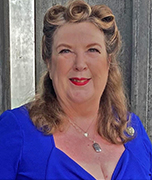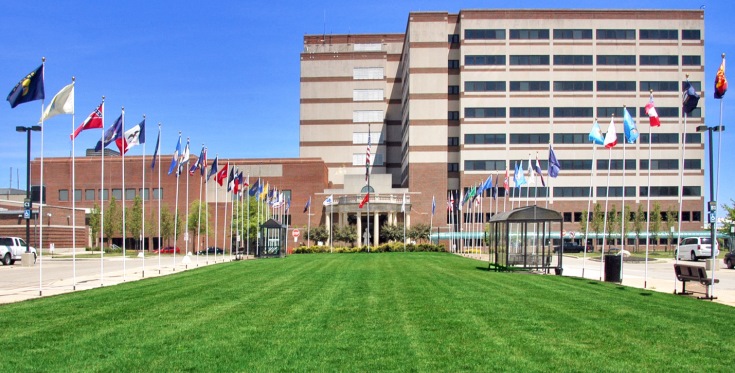While serving in the U.S. Women’s Army Corps, Ginger MacCutcheon experienced military sexual trauma. She later experienced the negative effects of her MST, including developing post-traumatic stress disorder.
For almost 40 years, MacCutcheon was silent about her experience. But now she shares her story with her fellow Veterans, hoping to encourage those with similar experiences to seek help through VA.
In the years after her attacks, MacCutcheon isolated herself. The stigma of discussing MST in the military made getting help feel impossible. She felt shame and guilt, feared betrayal and judgment and attempted suicide twice.
It was not until 2015 that she learned that support was available. A fellow Veteran had pointed out how on edge she was around other people. “He asked if I was getting help from VA,” MacCutcheon shared. “And I said, ‘I’m not missing any body parts. I can’t go there.’”
Getting her life back with telehealth and mental health support
But she soon found she could go to VA to get help with the effects of her MST. Her initial misunderstanding of how VA could help is partially why MacCutcheon is so active with Veterans now.
“I’m trying to get the word out to people and say, ‘Don’t let the best years of your life pass you by,’” she said.
Since seeking VA care, MacCutcheon has taken part in many programs that have helped her manage the effects of her MST. These programs include music therapy, women’s groups and telehealth. At one point during the COVID-19 pandemic, she was enrolled in four telehealth programs at a time.
MacCutcheon discovered telehealth when she moved to a new area. She didn’t feel comfortable going out yet so she looked for another option. “I think telehealth has given me the courage to speak to other people. With telehealth, I was able to talk to other people but I was in my home, a comfortable space for me.”
Many VA resources to help Veterans cope with MST
For Veterans who, like MacCutcheon, feel shame or guilt as a result of MST, speaking with a provider or therapist might not be a comfortable first step. VA offers many resources to help Veterans cope with MST. One resource is Beyond MST, a free, secure app with tools that help Veterans who have experienced MST manage their symptoms and improve their quality of life.
Veterans can also ask for a TeleMental Health video visit if they are not ready to speak with a provider in person. “Without VA, I really don’t think I would still be here,” she said.
MacCutcheon urged anyone hesitant to reach out for help to just take the first step. “VA is willing to meet you at the point that you’re at.”
Helping other Veterans find support
MacCutcheon volunteers at the Louis Stokes Cleveland VA Medical Center in the Employee/Patient Experience Service Office as administrative support, and is chairwoman of the Veterans’ Advisory Council. Through her role as chairwoman, she is focused on helping other Veterans and their caregivers understand and access VA services, treatments and benefits. She is also the commander of the Disabled American Veterans Chapter 116 in Brooklyn/Parma, Ohio, and an executive committee member of the DAV Department of Ohio. “I now feel like I have something to offer. I have help to offer people and I feel very strongly that it is my gift,” she added.
If you are experiencing the effects of MST, VA can offer support to suit your schedule and comfort level. To learn more, visit VA’s MST webpage.
Topics in this story
More Stories
VA is putting Veterans in the driver's seat for making medical appointments.
Larry Trujillo lost 44 pounds and improved his relationship with food during the 90-day TeleMOVE! telehealth program.
The Dayton VA Medical Center released its March 2025 Good News Report, spotlighting compassionate care, special recognitions, and life moments shared by Veterans and staff.







I’m just stunned at the stories here. I hope it’s all confidential. I’m glad today it’s much safer and easier for women to get help and benefits from what so many of us had to go thru.
I wish I had found your story years ago. I too hid 2 assaults for almost 50 years! 2 suicide attempts, on at the Colorado Springs. It took my years to get any benefits. Senator Bennett helped me get benefits, and stopped my SS being garnished for meds and therapy. What many of us went thru has helped MST victims get their benefits in in weeks not years. In 1965 and 66, there was no such thing as MST. Thank you for your bravery to tell your story.
I experienced MST in march 1983 in the army. I have spoken about it and I’m trying to benefit from counseling. But I need something more intense. Please help me I am struggling and have for almost 40 years.
A counselor not connected with the VA told me about a book that may help. “The body knows the score”. It had some interesting techniques you may find helpful.
Sorry. “The body keeps the score”.
It helped
I’m so sorry to hear about your experiences while serving your country. Talking about painful events can be difficult, even years later. Please know that you are not alone, and recovery is possible. To learn more about additional treatment options and other resources that can help, we encourage you to share your concerns with your current treatment provider. You could also reach out to your local Veterans Health Administration (VHA) MST Coordinator at https://www.mentalhealth.va.gov/msthome/vha-mst-coordinators.asp or visit http://www.mentalhealth.va.gov/mst. The Veterans Crisis Line, https://www.veteranscrisisline.net/ is also an important resource to know about. The Veterans Crisis Line is confidential, free, and available 24/7, and many responders are Veterans themselves. Dial 988 then Press 1.
I also was sexually and physicallyassaulted, the first time in 1978. He continued to assault me for 3 months. It was witnessed by 4 of my coworkers and was reported to the the watch supervisor. After a bad deployment in 2013/2014 I sought help. I had discovered that the military continues to cover up assaults. My VA at first was helpful, but it soon fell apart. Those diagnosis’s they told me I had were not actually added to my chart. It has been a struggle to get acknowledged for assaults that are carried out by my brothers in uniform, not the enemy. Sadly, a red state is a poor place for female vets to try to get help. I have discovered the attitude of insignificant and second class continues with the Oklahoma City VA towards female vets.
Annie, I’m so sorry to hear about your experiences while serving your country and the challenges you’ve experienced since. If you haven’t already, please consider reaching out to your local Veterans Health Administration (VHA) Military Sexual Trauma (MST) Coordinator at https://www.mentalhealth.va.gov/msthome/vha-mst-coordinators.asp for help. A local VHA Patient Experience Coordinator or Patient Advocate is another great resource. Please know that you are not alone. If you think additional support might be helpful to you in your healing journey, please know it’s never too late to connect with VA’s free military sexual trauma (MST) treatment resources at https://mentalhealth.va.gov/msthome/index.asp.